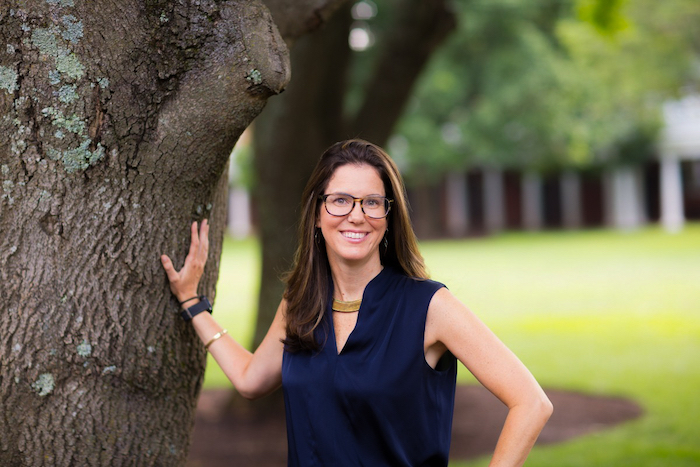Batten Professor Kirsten Gelsdorf Receives All-University Teaching Award

The following is an excerpt from UVA Today. Read the full story here.
Faculty members at the University of Virginia seek to inspire and challenge the next generation, no matter what the discipline. At the same time, most of their students come to class motivated to change the world for the better.
So how do professors help prepare students to find their paths forward?
UVA’s best teachers, recognized Wednesday at a dinner, strive to create “a positive environment for learning,” as kinesiology professor Arthur Weltman put it – classroom environments where students can connect with each other and feel comfortable enough to be wrong. Being accessible is key; professors keep their doors open to students, extending their influence beyond the classroom. They employ both “the art and science” of teaching, as neuroscientist Mary Kate Worden said.
Each year, deans, department chairs and colleagues take the opportunity to recognize excellent teachers through a set of awards, sponsored by the Office of the Executive Vice President and Provost. Included in the nomination materials with testimonials from colleagues and students is each faculty member’s unique teaching statement. There, they detail some of their thoughts for nurturing the learning that will benefit students for the rest of their lives.
“Our teaching award winners provide a snapshot of the wonderful work that our distinguished faculty do every day in the classroom,” said Archie Holmes, vice provost for academic affairs and professor of electrical and computer engineering. “Through their efforts, they create and support classroom and learning environments which engage all students and help them fully develop their talents, discover their passion, and engage in self-discovery so that they are prepared for leadership in their professional and personal lives.”
Advice from award recipient Kirsten Gelsdorf follows:
All-University Teaching Award: Kirsten Gelsdorf, Professor of Practice and Director of Global Humanitarian Policy, Frank Batten School of Leadership and Public Policy
When I finish designing a syllabus or a lecture, I ask myself, “In addition to knowledge and skills, what emotions may my students confront in this class; and will this combination of knowledge, skill and emotion provide an opportunity for them to discover their connectedness to each other and the world?”
Even in a lecture with 200 students, can each student feel engaged in such a way that they can confront divisive topics and not only think about how they form their opinions, but also the perspectives of others? One way I do this is to help students not only develop their writing, reading and speaking skills, but also explore the skill of listening. Students are asked to be aware of the different styles of listening they employ – autobiographical listening, surface listening, solution-oriented listening, deep listening, etc. They do exercises where they pair up to do radical listening and really dive into the opinions and beliefs of another student. They also have to think about how their listening state impacts their ability to absorb information and form conclusions.
Students also take part in small, in-class group debates on controversial unanswered policy questions. They often have to take positions that are not their own, or work with prompts such as: make an argument that includes empathy and justice and then make the same argument trying not to use any emotion, but relaying compelling data and evidence. This hopefully not only tests rigor, their knowledge of the issue and their ability to persuasively communicate a position, but also helps them further understand their beliefs and biases.
Related Content
Kirsten Gelsdorf

